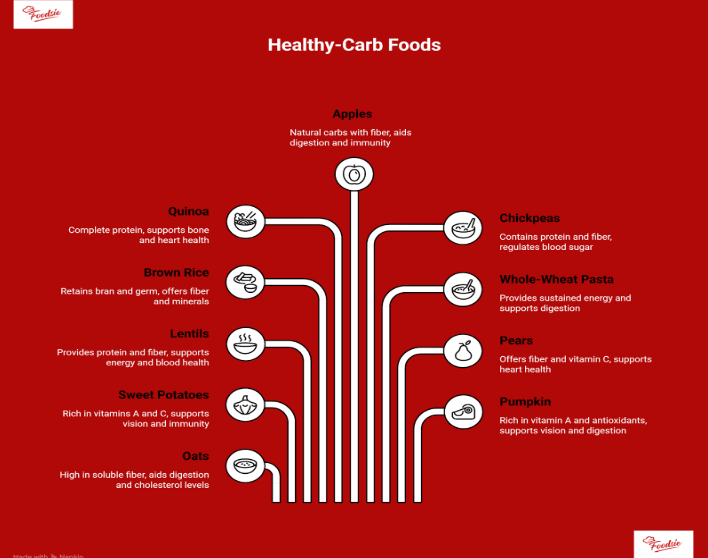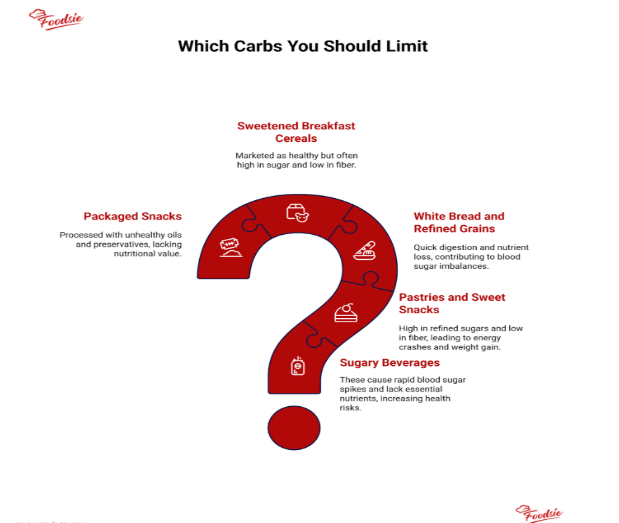
Best High-Carb Foods That Are Actually Good for You
2025-09-30
Healthy carbs are a great way to energize your body, boost your energy, and improve digestion. Foods like sweet potatoes, oats, quinoa, and lentils provide long-lasting energy, help with digestion, and keep you feeling full longer. These carbs are packed with fiber, vitamins, and minerals that support your overall health. By including these healthy carbs in your meals, you can enjoy better energy, improved mood, and a more balanced lifestyle.
In this blog, we’ll discuss the most powerful high-carb foods that support your overall health, explain how they work inside your body, and show you how to enjoy them in a balanced way.
Introduction
Carbohydrates are one of the three main macronutrients required for human survival, along with proteins and fats. Despite their importance, they are often misunderstood and labeled as unhealthy. This misconception overlooks the fact that many carbohydrate-rich foods are a fundamental part of essential nutrition for health. Whole grains, fruits, legumes, and starchy vegetables provide energy and supply fiber, vitamins, minerals, and natural compounds that support overall wellbeing.
What are healthy carbs?
Healthy carbs are foods that are less processed, rich in nutrients, and digest gradually. They help maintain blood sugar levels, provide energy for longer periods, and improve fullness after meals. Unlike refined carbohydrates, which have had their natural nutrients removed and can cause rapid spikes in blood sugar, nutrient-rich carb sources support digestion, brain function, and reduce the risk of long-term health problems like heart disease and type 2 diabetes.
Focusing on nutritional information such as fiber, vitamins, and minerals helps you choose the most beneficial carbs rather than judging them by carbohydrate content alone. Understanding these details shows why some carb sources are healthier than others.
The Role of Carbohydrates in Human Health
Carbohydrates are the body’s main source of energy. Glucose, the simplest form of carbohydrate, powers the brain, nervous system, and red blood cells. During physical activity, muscles rely on glycogen, the stored form of glucose, to perform well and stay strong. Not eating enough carbs over time can cause low energy, poor focus, and digestive issues.
Well-chosen carbohydrate foods provide:
- Long-lasting energy through slow digestion and steady glucose release.
- Dietary fiber, which maintains gut health, feeds good gut bacteria, and helps control cholesterol.
- Micronutrients, including B vitamins for energy use, magnesium for muscle and nerve function, and potassium for heart health.
- Protective plant compounds, such as antioxidants and phytochemicals, which protect cells and support long-term health.
Understanding the nutritional breakdown of different carbohydrate sources helps you make better choices for your diet.
10 High-Carb Foods That Are Good for Your Health
Selecting high-carb foods carefully can provide energy and support essential nutrition for health, while promoting overall wellbeing. Here are ten foods and ways to include them in balanced meals.

1. Oats
Oats are a whole-grain food containing high levels of soluble fiber, which aids digestion and helps maintain healthy cholesterol levels. They provide complex carbohydrates that release energy gradually. Oats are also a source of magnesium and iron, supporting muscle and nerve function. They can be included in breakfast bowls, porridge, or baked goods.
2. Sweet Potatoes
Sweet potatoes contain complex carbohydrates, dietary fiber, and significant amounts of vitamin A, vitamin C, and potassium. These nutrients support vision, immunity, and heart health. Sweet potatoes can be roasted, boiled, or mashed and are suitable for lunch or dinner.
3. Lentils
Lentils offer both carbohydrates and plant-based protein, along with folate, iron, and fiber. They support energy production, blood health, and digestive regularity. Lentils are suitable for soups, stews, or combined with grains to form nutrient-rich meals.
4. Brown Rice
Brown rice retains its bran and germ layers, providing fiber, B vitamins, and minerals such as magnesium. It supports sustained energy and healthy digestion. Brown rice can be combined with vegetables or lean protein for a complete meal.
5. Quinoa
Quinoa is a complete protein containing all nine essential amino acids, in addition to complex carbohydrates and fiber. It is also a source of magnesium, phosphorus, and manganese, supporting bone and heart health. Many people now use meal solutions for new recipes and ideas to include healthy carbs in balanced, nutritious meals.
6. Apples
Apples provide natural carbohydrates along with fiber, vitamin C, and antioxidants. They aid digestion, support immune function, and provide a slow energy release. Apples can be consumed as a snack or added to breakfast cereals and salads.
7. Chickpeas
Chickpeas contain carbohydrates, protein, and dietary fiber, along with folate and magnesium. They help regulate blood sugar and maintain muscle function. Chickpeas can be included in curries, salads, or roasted.
8. Whole-Wheat Pasta
Whole-wheat pasta contains fiber, B vitamins, and minerals. It provides sustained energy and supports digestive health. It can be prepared with vegetables, legumes, or lean protein to create balanced meals.
9. Pears
Pears supply carbohydrates, dietary fiber, and vitamin C. They aid digestion, support heart health, and provide gentle energy. Pears can be included in breakfast bowls, snacks, or desserts for added nutritional value.
10. Pumpkin
Pumpkin contains complex carbohydrates, fiber, vitamin A, potassium, and antioxidants. These nutrients support digestion, vision, and cardiovascular health. Pumpkin can be used in soups, roasting, or baking, forming practical meal solutions for balanced eating.
Which Carbs You Should Limit
Not all carbohydrates are beneficial. Some carb-rich foods are highly processed, low in nutrients, and can negatively affect your body when eaten frequently. Understanding which carbs to avoid is an important part of maintaining a balanced diet.

1. Sugary Beverages
Sodas, fruit drinks with added sugar, and energy drinks contain simple sugars that are quickly absorbed by the body. These cause rapid rises in blood sugar and provide no fiber or essential nutrients. Consuming them regularly can increase the risk of weight gain, type 2 diabetes, and heart problems. Choosing water, herbal teas, or natural fruit-infused drinks is a healthier option.
2. Pastries and Sweet Snacks
Cakes, cookies, donuts, and other baked items are often made with refined flour and added sugars. These foods are low in fiber, vitamins, and minerals. Regular intake can lead to sudden rises in blood sugar and a quick loss of energy. Limiting these treats and having them only occasionally is recommended.
3. White Bread and Refined Grains
White bread, white rice, and other refined grains have had the bran and germ removed, which removes most of their fiber and nutrients. They are digested quickly, which can lead to sudden increases in blood sugar and overeating. Choosing whole-grain alternatives provides longer-lasting energy and better nutrient content.
4. Sweetened Breakfast Cereals
Many breakfast cereals marketed as “healthy” contain added sugars and refined grains. While they may be convenient, they lack the fiber and protein needed to support sustained energy. Opting for whole-grain, unsweetened cereals or oats ensures a more balanced start to the day.
5. Packaged Snacks
Chips, crackers, and other processed snacks often contain refined flour, oils, and preservatives. These provide calories without meaningful nutrition. Frequent consumption can contribute to digestive issues and unhealthy weight gain. Preparing homemade snacks using whole grains, legumes, or vegetables is a more nourishing alternative.
Limiting these carb sources does not mean removing all carbohydrates from your diet. Instead, focusing on nutrient-rich foods helps maintain consistent energy, supports brain function, and contributes to overall health
Conclusion
Carbs can be one of the most nourishing parts of your diet when you choose the right ones. Natural, fiber-rich foods like lentils, oats, quinoa, fruits, and vegetables provide energy along with vitamins, minerals, and antioxidants. They support digestion, help you feel full, and aid brain and heart function.
Planning meals with a variety of these healthy carbs makes daily nutrition balanced and enjoyable. Using simple recipes and practical tips helps prepare nutritious meals without stress.
Want to eat healthier and feel energetic every day? Sign up for Foodsie today and find simple ways to include healthy carbs in your meals and enjoy healthy meals.
Frequently Asked Questions
1. What food has the highest carbs and lowest calories?
Foods that are high in carbohydrates but low in calories usually come from vegetables, fruits, and certain grains. Examples include potatoes, sweet potatoes, corn, carrots, and most fruits like apples, pears, and berries. These foods provide energy while keeping calorie intake moderate. Choosing these carb-rich options helps maintain energy levels, supports digestion, and provides essential vitamins and minerals, making them a smart choice for balanced eating.
2. Which carbs are best for gut health?
Carbohydrates that are rich in fiber are the best for gut health. Whole grains like oats, brown rice, and whole-wheat pasta, as well as legumes like lentils and chickpeas, help feed good bacteria in your digestive system. Fruits and vegetables, especially those with edible skin or pulp, provide soluble and insoluble fiber that keeps digestion smooth and supports overall gut function. Including these fiber-rich carbs regularly can improve digestion and promote a healthy gut environment.
3. Where can I track nutritional information easily?
You can track nutritional information easily from Foodsie, one of the best apps for this purpose. It provides clear, itemized details for every food you eat, helping you understand your diet and make informed choices. Key features include:
- Calories per item: See exactly how much energy each food provides.
- Carbohydrates breakdown: Know how many grams of carbs are in each portion.
- Fiber content: Track soluble and insoluble fiber for better digestion and gut health.
- Vitamins and minerals: Check essential nutrients like vitamin C, magnesium, potassium, and iron.
- Simple meal tracking: Plan and adjust meals to create balanced plates that support your health goals.
- Easy-to-read interface: No confusion, all information is presented clearly so you can act on it immediately.
Using Foodsie helps you make smarter food choices, understand your daily intake, and plan meals confidently, making it an essential tool for anyone who wants to eat healthier and stay energized.